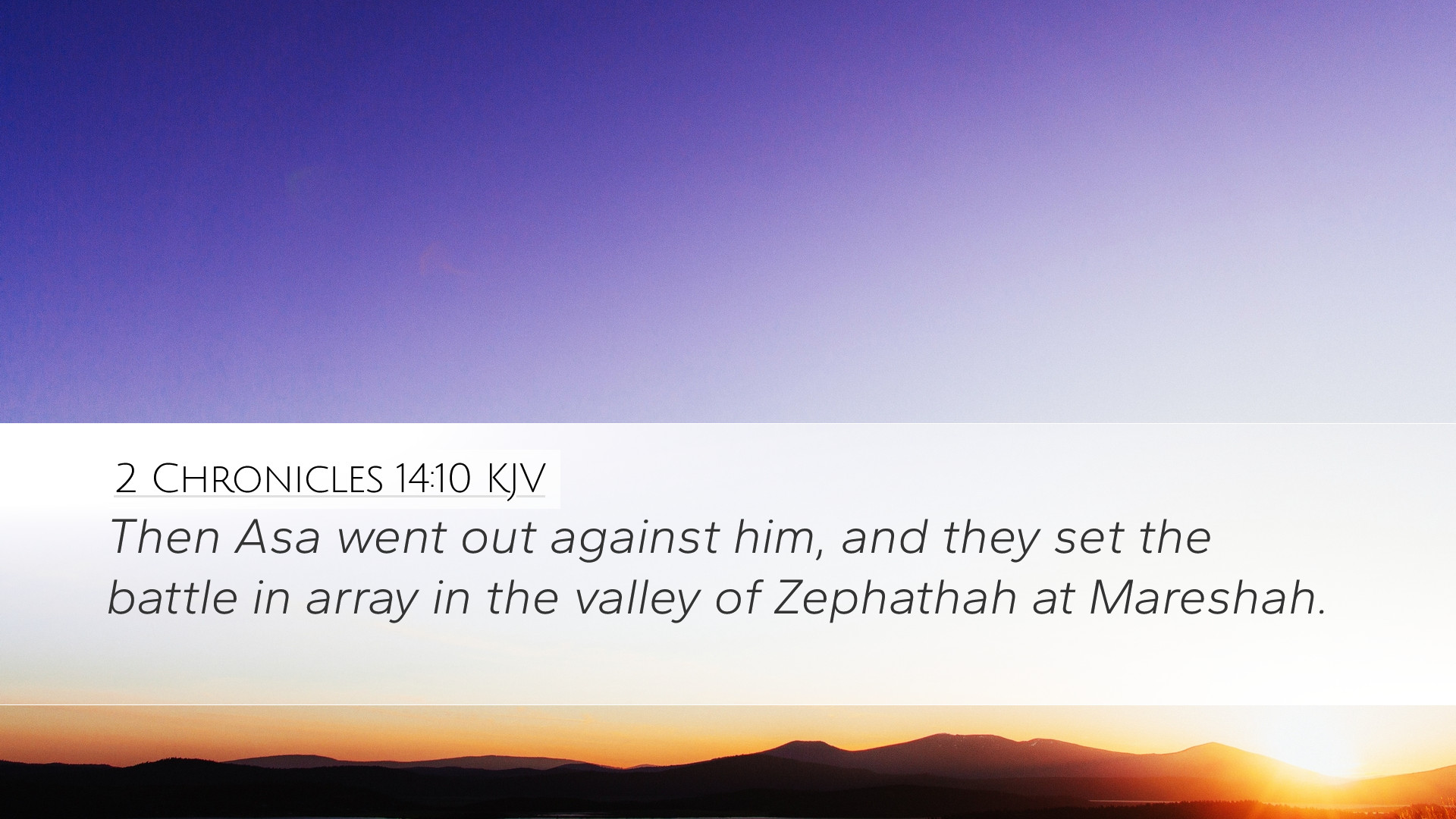Commentary on 2 Chronicles 14:10
2 Chronicles 14:10 states: “Then Asa went out to meet him, and they set the battle in array in the valley of Zephathah at Mareshah.”
Contextual Overview
The narrative of 2 Chronicles 14 reflects a crucial moment in the reign of King Asa of Judah, who was noted for his reforms and insistence on true worship. This verse pertains to Asa's confrontation with Zerah the Ethiopian, who came against Judah with a vast army. This context highlights Asa's reliance on God amidst adversity, a recurring theme in the chronicles of the kings.
The Nature of Asa's Leadership
1. Righteous Leadership: Asa's reign was characterized by a desire to serve God. According to Matthew Henry, Asa took bold steps to remove idol worship, thereby establishing religious reforms. These foundational changes set the stage for his confidence in God during wartime.
2. Strategic Preparedness: Albert Barnes points out that Asa prepared for battle by arranging his forces strategically. His willingness to confront an overwhelming foe demonstrates strong leadership and faith. Barnes emphasizes that Asa’s preparedness was not merely military but also spiritual, showcasing his reliance on divine aid.
3. Faith in Action: Adam Clarke notes that Asa's confrontation with the Ethiopian army can be seen as an act of faith. Instead of retreating or despairing, Asa advanced against an adversary who outnumbered him significantly. Clarke adds that this illustrates the biblical principle that faith often precedes divine intervention.
Spiritual Reflections
1. The Role of Prayer: In understanding Asa's actions, it is crucial to examine the element of prayer in his leadership. Prior to this battle, Asa had earlier claimed reliance on the Lord, which is indicative of a leader who communicates with God. Henry asserts that a leader’s power often correlates with their prayer life, emphasizing the need for constant dependence on God.
2. Divine Assistance: The outcome of Asa's confrontation is paramount in this text. God intervened miraculously on behalf of Asa and Judah, leading to a significant victory. Barnes asserts that God’s assistance to Asa was a direct response to his faith and commitment. This reflects the greater biblical theme that God fights for his people when they place their trust in Him.
Application for Today’s Believers
1. Courage in Adversity: 2 Chronicles 14:10 serves as a reminder for contemporary believers of the importance of acting with courage in the face of challenges. Just as Asa was unafraid to confront Zerah, Christians are encouraged to face their spiritual battles with confidence, trusting in God’s strength.
2. The Importance of Preparation: Asa's meticulous preparation for battle serves as a lesson on the necessity of spiritual and practical preparedness. Pastors and leaders today should consider both aspects—being ready in their faith as well as in their strategies for ministry and outreach.
3. Trusting in God's Deliverance: The ultimate message of Asa’s victory lies in the assurance that God responds to the faith of His followers. This encourages believers to persist in their faith, seeing that God is actively involved in their lives, fighting their battles when they submit to Him wholly.
Conclusion
2 Chronicles 14:10 encapsulates a pivotal moment of faith and leadership exemplified by Asa, providing rich insights for pastors, students, theologians, and Bible scholars. As detailed by commentators such as Matthew Henry, Albert Barnes, and Adam Clarke, this passage illustrates the interplay between divine trust, strategic action, and the outcomes of faith. Asa's story invites readers to reflect on their own reliance on God amidst life's challenges, encouraging a vibrant relationship with the Almighty.


